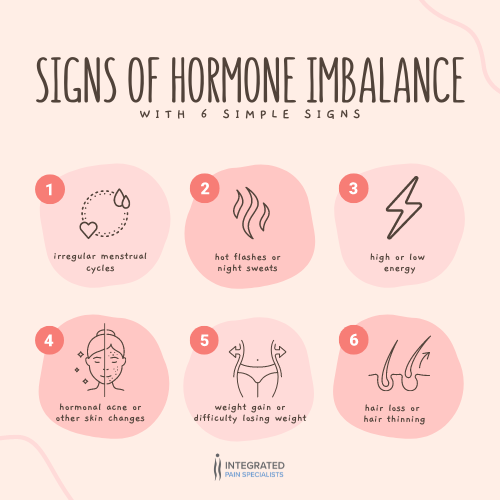Hormones play a crucial role in regulating many important bodily functions, including metabolism, growth and development, reproductive health, and stress response. Hormone balance is essential for maintaining overall health and well-being, and even minor imbalances can have significant effects on physical and emotional health.
For example, imbalances in thyroid hormones can cause fatigue, weight gain, and depression, while imbalances in sex hormones can lead to menstrual irregularities, infertility, and decreased bone density. Hormone imbalances can also increase the risk of certain chronic health conditions, such as diabetes, cardiovascular disease, and osteoporosis.
Maintaining hormone health through healthy lifestyle choices, regular exercise, and appropriate medical care is essential for preventing and managing hormone imbalances and promoting overall health and well-being.
What is hormone imbalance?
Hormone imbalance refers to a situation where there is an abnormal level of hormones in the body, either too high or too low. It can be caused by a variety of factors, including medical conditions, medications, stress, and lifestyle choices. Symptoms can vary depending on the type and severity of the hormone imbalance, and may include changes in mood, energy level, appetite, weight, sleep patterns, and menstrual cycles. Treatment options include medication, lifestyle changes, and hormone therapy. It is important to consult with a healthcare professional for proper diagnosis and treatment.

How to test for hormone imbalances?
Testing for hormonal imbalances typically involves a combination of blood tests, urine tests, and/or saliva tests to measure the levels of various hormones in the body. The specific tests used may vary depending on the suspected hormonal imbalance and the individual’s symptoms.
Some common tests used to evaluate hormonal imbalances include:
- Thyroid function tests: Measures the levels of thyroid-stimulating hormone (TSH), thyroxine (T4), and triiodothyronine (T3) to evaluate thyroid function.
- Follicle-stimulating hormone (FSH) and luteinizing hormone (LH) tests: Measures the levels of FSH and LH to evaluate reproductive hormone function and menstrual cycle regularity.
- Estrogen and progesterone tests: Measures the levels of these hormones to evaluate reproductive health and menstrual cycle regularity.
- Testosterone tests: Measures the levels of testosterone to evaluate reproductive health and libido.
- Cortisol tests: Measures the levels of cortisol to evaluate stress response and adrenal gland function.
It’s important to note that hormonal imbalances can be complex and may require additional testing beyond what is listed above. Additionally, hormone levels can fluctuate throughout the day and be affected by various factors such as stress, diet, and medication, so timing and preparation for the test is important. A qualified healthcare professional can help determine which tests are most appropriate for each individual’s situation.
How can peptides help treat hormone imbalances?
Peptides are small chains of amino acids that can have a variety of biological effects in the body, including influencing the release and activity of hormones. While there is some research suggesting that certain peptides may have potential therapeutic benefits for treating hormone imbalances, it’s important to note that the use of peptides for this purpose is still largely experimental and not yet widely accepted or regulated by the medical community.
Some peptides that have been studied for their potential effects on hormone balance include:
- Gonadotropin-releasing hormone (GnRH) peptides, which may stimulate the release of luteinizing hormone (LH) and follicle-stimulating hormone (FSH) and thereby help regulate the menstrual cycle and improve fertility in women.
- Growth hormone-releasing peptides (GHRPs), which may stimulate the release of growth hormone and promote muscle growth, fat loss, and improved energy levels.
- Melanocyte-stimulating hormone (MSH) peptides, which may regulate melanin production and improve skin pigmentation.
It’s important to note that the use of peptides for hormone balance should only be done under the guidance and supervision of a qualified healthcare professional, as they can have potential side effects and interactions with other medications. Additionally, lifestyle changes such as healthy eating, exercise, stress reduction and proper sleep can have a positive impact on hormone balance.

Call Integrated Pain Specialists to schedule an appointment
You may want to consider scheduling an appointment with Integrated Pain Specialists to evaluate for a possible hormone imbalance if you are experiencing persistent or concerning symptoms that may be related to hormones.
Some common symptoms of hormonal imbalances include:
- Irregular menstrual cycles or missed periods
- Heavy or painful periods
- Hot flashes or night sweats
- Fatigue or low energy
- Mood changes or depression
- Weight gain or difficulty losing weight
- Hair loss or thinning
- Acne or other skin changes
- Low libido or sexual dysfunction
If you are experiencing any of these symptoms or have concerns about hormonal imbalances, you should call us today at Integrated Pain Specialists. We can help you determine if testing for hormone imbalances is necessary and what treatment options may be appropriate for your individual situation.

